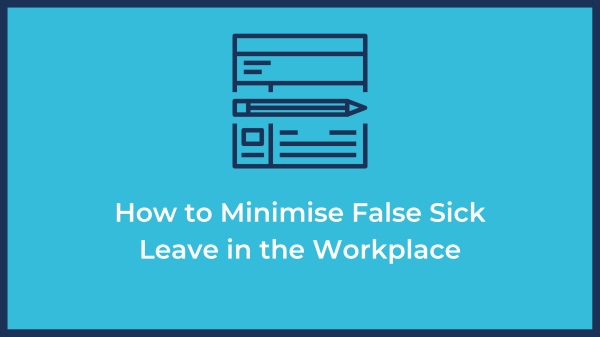How to Minimise False Sick Leave in the Workplace
Published: 17/05/2019
Free trial
See for yourself how you can save time and money. Enter your details below for a free 30 day no-obligation trial.

There is something for company founders and ops directors to ponder: How often do your staff take sick days? What’s that number compared to their annual leave? Unless you know your employee has a condition that prompts frequent sick leave, frequent sick days may indicate you’re dealing with absenteeism. And it costs your business a lot.
The Automatic Data Processing (ADP) survey, cited by the Chartered Management Institute, uncovered that 27% of UK employees think it’s acceptable to ‘pull a sickie’ at work. Of those, 85% said doing so twice or more every year is reasonable.
As a whole, absenteeism costs our economy a whopping £18bn every year. It can be a massive headache for all companies, especially small and medium-sized businesses with smaller workforces and less wriggle room to reallocate work if needed. However, there are ways to address and prevent this from happening. Carry on reading to find out more.
The root of claiming to be sick when an employee wants a day off is their lack of trust in you as an employer. They may not feel comfortable requesting a day off simply because they are tired and choose to lie as a solution. You need to build an environment where they feel safe to be honest with you.
Have you taken the time to get to know each of your employees individually? Building stronger bonds on a personal level can strengthen professional relationships. So, schedule regular one-on-ones with each employee, find out how they’re doing, talk about their work, praise their achievements, and discuss goals.
These meetings are also good opportunities to identify any issues employees are having and for you to offer support and practical solutions – showing them you’re an employer who cares. In other words, as Kim Scott teaches in Radical Candor, we should care personally and challenge directly.
You can also strengthen bonds between you and your team and among colleagues by taking the company on a team-building day. Team-building activities benefit through increased motivation, collaboration, communication and morale.
But for team building to succeed, the activities must be fun—i.e., there should be no ‘fall back and I’ll catch you’ exercises. Think more of things like minigolf, a cocktail-mixing class, a trip to a theme or adventure park, or an escape room experience.
Humans tend to lose motivation when their effort goes unnoticed. Lack of recognition leads to lower performance, loss of interest, lower ambition and, eventually, disengagement in the form of faking sick leave. This is entirely preventable - and easier than you think.
Failing to acknowledge your team for their work can be incredibly demotivating, so give credit where credit is due! A sincere, face-to-face ‘thank you’ goes an extremely long way and shows employees that their efforts aren’t going unnoticed.
Has a particular employee gone the extra mile? You could recognise them in a group email or company newsletter. You might also consider the occasional reward for individual employees or your team – an early Friday finish, a bottle of bubbly, or vouchers.
If you’re not already offering flexible working, you’re late to the party. Offering flexible work options can help your employees strike that golden work-life balance, which can help lower stress and the need to ‘pull a sickie’.
You could consider allowing employees to work at home one day a week. Or, you might want to let your team start and finish earlier or later if they need to do the school pick-up or want to dodge the morning commute. Not only will this show you care for their well-being, but it also indicates you trust them.
You may not have issues with false sick leave in your company or have no evidence of it being untrue. Either way, you should take action as soon as possible. Even if absenteeism doesn’t apply in your organisation, you lose nothing from using the above-described measures.
Quite the opposite - you gain plenty. Building a healthy, trust-driven environment where you care for your staff drives improvement across many areas of your business: cooperation, alignment, and trust. So, the things listed in this article are not just solutions or preventative measures; they’re elements that build a healthy company environment.
Timesheet Portal has a unique Absenteeism Management feature that allows employers to record, approve and report on staff absences. Unexpected illness can be recorded using the timesheet module, while planned sick leave can be approved in advance with the leave management feature.
Our software allows your business to calculate absence statistics, such as total absence spells, an individual’s total absence and average absence, and the Bradford factor score calculation.
Employees choosing to take false sick leave instead of the time off they’re entitled to is financially damaging to your business. But, more importantly, it indicates more deeply rooted issues within your organisation that you must address ASAP.
To curb absenteeism in your company, you should work hard to provide a positive, supportive and inclusive workplace for your team. Show them you care about their health, happiness and general well-being; they’re more likely to care about their job and your company. It’s as simple as that.
Start building a healthier work environment today so it pays off in the future. We will help.